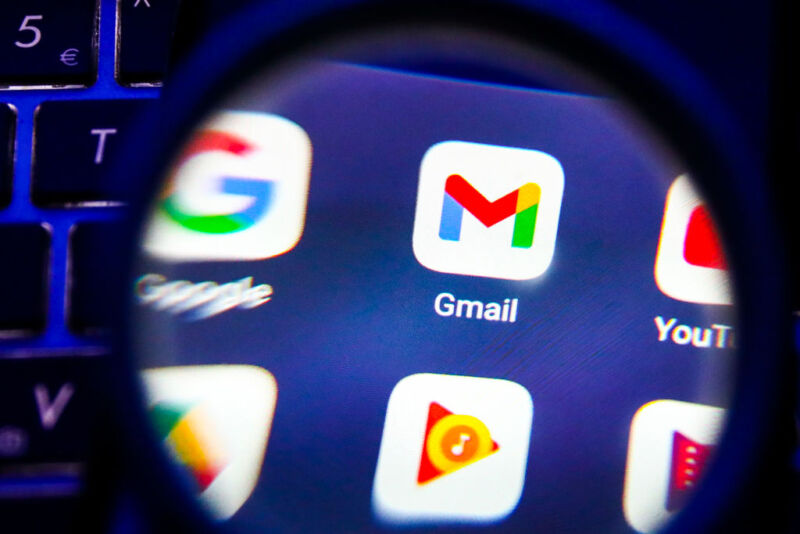
Earlier this month, Google sent a request to the Federal Election Commission seeking an advisory opinion on the potential launch of a pilot program that would allow political committees to bypass spam filters and instead deliver political emails to the primary inboxes of Gmail users. During a public commenting period that's still ongoing, most people commenting have expressed staunch opposition for various reasons that they're hoping the FEC will consider.
"Hard pass," wrote a commenter called Katie H. "Please do not allow Google to open up Pandora's Box on the people by allowing campaign/political emails to bypass spam filters."
Out of 48 comments submitted as of July 11, only two commenters voiced support for Google's pilot program, which seeks to deliver more unsolicited political emails to Gmail users instead of marking them as spam. The rest of the commenters opposed the program, raising a range of concerns, including the potential for the policy to degrade user experience, introduce security risks, and even possibly unfairly influence future elections.
Business Insider reported that the period for public commenting ends on Saturday, July 16, which is longer than what was shared in conflicting reports that said the initial deadline to comment was July 11. That means there's still time for more Gmail users and interested parties to chime in.
Top concerns from Gmail users
Having the extra five days to comment may not seem like a lot, but at least the minor extension provides an opportunity to those who perhaps are not yet aware of Google's proposal. FEC spokesperson Judith Ingram told Business Insider that the FEC "declined to comment on whether the agency believes it has given the public adequate time to comment on the matter." The FEC and Google did not immediately respond to Ars' requests for comment.
Already, many Gmail users have rushed to weigh in, though, with the majority of commenters citing their top concerns and urging the FEC to disapprove of the pilot program as much as they do.
For some opposing commenters, it's about rejecting unnecessary strains on the Gmail user experience. In short: People don't want emails coming to their inbox that they did not sign up for. Some users threatened to leave Gmail if political emails were diverted to the primary inbox, saying politicians didn't deserve special treatment by getting exemption from the spam folder.
"Swamp my inbox with political spam if you want me to switch to my Yahoo account full time," wrote commenter Thomas Beard. "I'm not married to your service."
Other commenters were more concerned over a perceived government overreach. Similar to an exemption to the Telephone Consumer Protection Act that allows politicians to bypass do-not-call lists, politicians would be able to bypass Gmail spam filters, if the FEC approves. This could potentially lead to even more misinformation spread, commenters complained. Other commenters said that the move could also introduce security risks. One commenter imagined bad actors who register to run for office, become exempt from spam filters, and position themselves to scam unsuspecting users who trust Google to filter out malicious content.
A few commenters suggested that now is the time for the FEC to strengthen regulations on political communications, not open citizens up to even more rampant political messaging.
"Please do not allow this awful idea to proceed," a commenter called "d ervin" wrote. "Google and Facebook/Meta have ruined everything [on the] Internet, and I wish at least one of my governments' agencies would have the guts to curtail their overreach."
The worst-case scenario for some commenters is a future where political spam delivered to primary inboxes influences elections. A few commenters expressed fears that Google's seemingly liberal political bias would influence Gmail users by delivering emails from Democrats to the primary inbox, while still marking Republican emails as spam. Some commenters cited how campaign emails were implicated as part of what caused the January 6 riot (by pushing an election fraud conspiracy), and thus say that political emails deserve even more scrutiny, not less.
Others were concerned that older Gmail users would become more vulnerable to "emotionally charged" messaging that they never signed up for.
"This is a HORRIFIC idea," wrote commenter Natalee Roan. "My 85-year-old mother gets over 20 emails A DAY from political campaigns—each one screaming that if she doesn't give today, it will be the end of the USA as we know it. They are all from legitimate campaigns, but not one of them is Opt-in—meaning they are the very definition of SPAM [unsolicited]. These emails are adding to the political divide by using tactics that are designed to literally scare people into giving donations and severely contributing to our political divide. I can't think of anything worse for our democracy than allowing these emails to proliferate by not sending them through SPAM filters."
Some commenters pointed out that all this move does is put the onus back on the user to mark political messages as spam. For one commenter, that seemed like a good thing: giving control back to the user to decide what hits their inbox. But another said that due to the volume of political emails that could be hitting inboxes soon, it was another reason to staunchly oppose. Nobody has time to sit and mark dozens, let alone hundreds or thousands, of emails as spam.
The only other commenter to speak in favor of the proposal suggested that Gmail's longstanding practice of diverting political emails to spam was a threat to protected political speech. By sending political emails to the primary inbox, it ensures that everyone's messaging gets the same circulation. However, another commenter suggested that by sending more political emails to inboxes, Gmail could stoke apathy toward politics, not support Gmail users' engagement with all political views.
"This is a surefire way to turn people OFF to getting more engaged in the political process at a crucial time when we need a more aware and participating electorate," wrote commenter Matt Morain.
reader comments
158